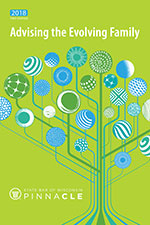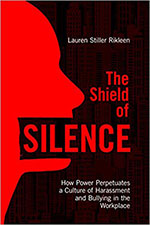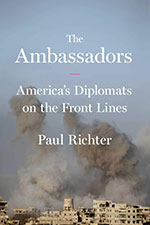 VERDICT: It’s a Keeper
VERDICT: It’s a Keeper
Advising the Evolving Family
By Christopher S. Krimmer, Emily Dudak Leiter & Theresa L. Roetter (Madison, WI: State Bar of Wisconsin, 2018). 188 pgs. Order, https://marketplace.wisbar.org.
Reviewed by Jamie A. Epstein
The authors of Advising the Evolving Family address a variety of situations affecting LGBT and unmarried couples. This book, like many published by the State Bar of Wisconsin, is organized in a user-friendly outline format that makes it easy for readers to find specific information without having to skim through lengthy prose.
The first substantive chapter, “Family Formation, and Protection for Gay and Lesbian Couples,” addresses assisted reproductive technology (that is, artificial insemination, in vitro fertilization and embryo transfer, and surrogacy) and adoption (domestic, foreign, and the foster-to-adoption route). While the focus of this chapter is on same-sex couples, the options presented also apply to prospective parents in opposite-sex couples and those without a partner. The chapter goes on to address legal protections for same-sex couples. For example, step-parent adoption is no longer necessary for same-sex spouses, but the authors recommend obtaining a parentage order to confirm the parental rights of the nonbiological parent.
Want to Review a Book?
Please request a book and writing guidelines from Wisconsin Lawyer managing editor Karlé Lester, at klester@wisbar.org or (608) 250-6127. Reviewers may keep the book reviewed. Reviews of about 500 words are due within 45 days of receiving the book. Reviews are published, space permitting, in the order received and may be edited for length and clarity.
The authors address both state-employee and same-sex domestic partnerships in the chapter on Wisconsin’s domestic partnership registries. Domestic partnerships allowed state of Wisconsin and local government employees to confer certain Wisconsin Department of Employee Trust Funds benefits on surviving partners. Before marriage equality, domestic partnerships provided an option for same-sex couples to obtain some limited rights. The option of enrolling in the state Domestic Partnership Registry no longer exists, and the benefits of being on the registry are limited at this point.
“Estate Planning for Unmarried Couples” looks at the financial and asset management concerns that arise from owning real estate together (for example, are the parties tenants in common or joint tenants with rights of survivorship?) and nonprobate transfers of property such as life insurance, retirement accounts, joint accounts, and jointly titled vehicles. This chapter also looks at what is necessary when drafting powers of attorney for health care, wills, living wills, and trusts.
The authors conclude with a chapter addressing legal and equitable claims at termination of relationships between unmarried individuals. Much of this chapter is focused on unjust-enrichment, or Watts, claims. These unjust-enrichment claims are similar to property division within a divorce, and courts apply related principles to divide assets accumulated by unmarried couples during the time of the parties’ joint enterprise or mutual undertaking. The rest of the chapter briefly touches on a potential exception to the general denial of palimony and the limited options available to nonbiological or nonadoptive parents when the relationship ends.
Although this book might not become a standard for every law firm, it provides an easy reference on a variety of topics such as adoption and estate planning that many family attorneys do not deal with regularly. Advising the Evolving Family is a keeper for anyone looking for a quick guide to less frequent issues affecting families.
Jamie A. Epstein, Marquette 2015, works at the Women’s Divorce & Legal Clinic LLC, Milwaukee, representing clients in divorce, paternity, and legal separation actions in southeastern Wisconsin. She also works as a guardian ad litem in Milwaukee County.
 VERDICT: It’s a Keeper
VERDICT: It’s a Keeper
The Shield of Silence: How Power Perpetuates a Culture of Harassment and Bullying in the Workplace
By Lauren Stiller Rikleen (Chicago, IL: Ankerwycke, 2019). 263 pgs. $24.95. Order, shopABA.org.
Reviewed by Jenifer Bizzotto
In Shield of Silence, attorney-consultant Lauren Stiller Rikleen braids compelling quantitative and qualitative data to draw attention to the horrific prevalence and profound effects of workplace sexual harassment.
The book begins by taking readers, industry by industry, through various case studies that document the stunning ways that sexual harassment has infiltrated nearly every sector of the economy. Written in the wake of the #MeToo movement, which has uncovered abuser after abuser and the systems within which they operate, Rikleen’s book deftly profiles recent scandals that, in the context of an ever-accelerating news cycle, have been unjustly sidelined. In the discussion of the entertainment industry, for example, the reader is confronted with information not only about Harvey Weinstein, Charlie Rose, and Leslie Moonves, but also about the institutions that failed to hold these men accountable long before the scandals hit.
This background transitions nicely into the book’s focus on power structures. Wielding research from dozens of studies, Rikleen argues that the problem is not that employers do not know the nature or extent of sexual harassment; rather, the problem is that, to protect “power players,” employers purposely fail to intervene. For example, in the context of Larry Nassar, the former USA Gymnastics coach accused of abusing more than 350 children, Rikleen writes that “the reality is that all the signs were there – and then ignored.” This is all because businesses and organizations actively seek to protect rainmakers, but as Shield of Silence explores in both financial and social terms, at what cost?
The legal profession does not escape censure from the author, herself a lawyer. Indeed, the book’s appendix incorporates the full text of a member survey conducted by the Women’s Bar Association of Massachusetts, the results of which are staggering. For example, more than 37 percent of respondents stated that they had been the recipient of an unwelcome email, text, or instant message of a personal or sexual nature at work in a 10-year period. Meanwhile, more than 66 percent affirmed that they did not report the incident, many out of fear of retaliation, or, surprisingly, because respondents knew of other complaints that had gone ignored.
Rikleen also discusses how courts have “made rules that have effectively gutted Title VII” in a way clearly not intended by Congress, and how the onus is on judges to level the playing field that they made uneven.
As lawyers, we tend to focus on actionable conduct, but Shield of Silence reminds us “that the law is simply a floor for behavior, not a ceiling.” Rikleen calls on the legal profession, which has much power and includes many employers, to lead the way toward a more equitable workplace. And in the wake of #MeToo, it’s more important than ever to heed the call.
Jenifer Bizzotto, U.W. 2018, is a staff attorney at Wisconsin Judicare, Wausau. She advocates for workers across a diversity of practice areas, including employment discrimination, unemployment appeals, driver’s license recovery, wage claims, and more.
 VERDICT: It’s a Keeper
VERDICT: It’s a Keeper
The Ambassadors: America’s Diplomats on the Front Lines
By Paul Richter (New York, NY: Simon & Schuster, 2019). 322 pgs. $28. Order, www.amazon.com.
Reviewed by Irwin Kass
This book is a keeper. I liked it because the author brought me close to the action and intrigue of being a U.S. State Department foreign-service officer on a dangerous assignment in another country. Also, the author does not affix blame to any administration for a failed foreign policy. Instead, he lets readers decide who, if at all, is to blame, by objectively relating the stories of four patriots who spent the majority of their adult lives on the front lines for the United States. At times I thought I was reading the script of the TV series Homeland. The author suggests that this series was based in part on one of the featured foreign officers, Anne Patterson.
A passage from page 277, in a chapter aptly titled “Cool Heads in Hot Spots,” summarizes the point of this book. It states, “But Patterson, like Ryan Crocker, Robert Ford, and Chris Stevens, had already made a mark. They had gone to the hardest places, as their superiors had asked, and done the hardest things. In a time of confounding challenges, they were sent repeatedly on the toughest assignments because they could improvise policy, manage teams of thousands, and sometimes, in a crisis, help run their host governments as well.”
The book chronicles the activities of these four State Department officials after the terrorist attacks on Sept. 11, 2001. The author takes readers to many countries, including Afghanistan, Iraq, Pakistan, Syria, Libya, and Egypt. Patterson, Crocker, Ford, and Stevens all held the title of ambassador. However, they were not the stereotypical cocktail-sipping party hosts one associates with this title. They were Mideast specialists also known as Arabists, more specifically, outdoor Arabists, because they rarely conducted their activities from within the safe confines of a secure embassy.
The ambassadors prided themselves on going where the action was because that was where the best outcomes could be achieved, if at all. They usually had to work with dictators posing as duly elected presidents and against members of the factions that wanted to overthrow them. However, sometimes they found themselves working against the former and with the latter, at great danger, if to do so furthered White House policy. Their goal was to preserve the peace while promoting U.S. interests. They often conducted diplomacy face to face with enemies at tremendous risk.
At the outset, the ambassadors often voiced concerns about the formation of policy objectives, but once the White House set a policy regarding which foreign persons to support and which to oppose in any given country, these loyal individuals carried it out without objection and to the best of their abilities. Like sausage making, making policy was messy, smelly, and time consuming. The author does a good job of showing how this was done and the role these ambassadors played in the formation of such policy.
The author also writes about contentious meetings, to show the friction between the State Department and the Defense Department. As a result of this friction, the four officers often found themselves isolated in foreign countries, having to improvise so as to best implement the policy. The author does a good job of showing how this animosity would sometimes thwart the success of their efforts.
These four ambassadors were in danger at all times while on assignment, often barely escaping death. Unfortunately, one of them made the ultimate sacrifice while in Libya. The author spends considerable time explaining the events that preceded the death of the ambassador and some colleagues and how the policy toward foreign involvement was altered by the deaths.
The ambassadors were our country’s troubleshooters, trying to head off attacks against the United States. They were ready to go where the action is when called on to do so. It is comforting to know that today there are others like them who are doing likewise. One day, I hope, a book will be written about them, too.
Irwin Kass, Chicago-Kent 1976, is retired after practicing law in Madison.
